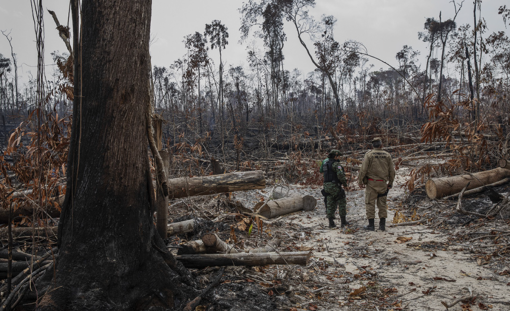Fake News and Deforestation: The Double Threat to Planetary Health
Brazil, known for its vast Amazon rainforest, rich biodiversity, and crucial global player in the fight against climate change, has been grappling with the dual challenges of deforestation and the spread of fake news, especially during the administration of the former far-right president, Jair Bolsonaro. When coupled, these phenomena can prove nefarious to protect people’s lives and safeguarding a healthier future for all human beings. For instance, wildfires increase the dispersion of toxic particles in the atmosphere, thus increasing the likelihood of respiratory diseases. Also, wildfires jeopardize local fauna, cause ecosystem disturbances, and reduce soil fertility. In short, we cannot be safe from pandemics and health emergencies without an equilibrium between humans and nature. Still, fake news about deforestation in the Amazon rainforest has prevented action to protect the biome.
The rise of social media platforms has amplified the dissemination of misleading information, which has had significant consequences for Brazil's environmental policies and efforts to combat deforestation. Misinformation campaigns surrounding deforestation in Brazil have perpetuated inaccurate narratives and obscured the true extent of the problem. False claims and manipulated images are shared, leading to misconceptions about the causes and actors behind deforestation. The spread of fake news undermines public trust and hampers the implementation of effective conservation strategies and regulatory measures. It becomes increasingly challenging for policymakers, scientists, and environmental advocates to combat deforestation when inaccurate and false information influence public opinion and shapes policy debates.
In sum, fake news thus distorts the reality of deforestation in the country, hindering public understanding and impeding effective action to address this critical issue. Indeed, disinformation (i.e., false information deliberately created) and misinformation (i.e., correct information but displaced and decontextualized) had been employed during Bolsonaro’s administration to avoid enacting policies to protect the environment as well as to reduce public trust in environmental bodies by denouncing them as corrupts and inefficient. For example, official bodies mentioned that deforestation increased by 88% from 2018 to 2019. Yet, Bolsonaro said it was not true while noting that “Brazil was the country that most preserve the environment.”
While some fact-checking bodies have been created to fight against fake news in the Amazon region, such as the Amazônia Livre de Fake (Amazon free of fake news), we have a long route to fight against fake news to raise awareness to protect nature and improve people’s wellbeing.

